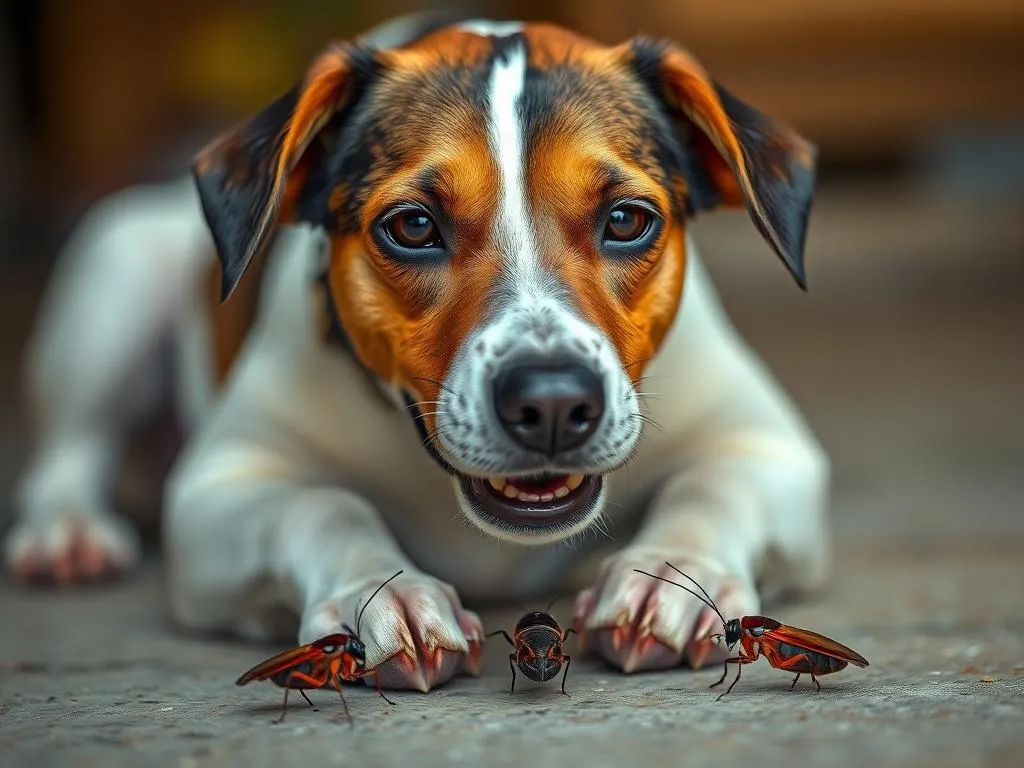
Did you know that dogs have been known to eat just about anything they find? From lost socks to discarded food, their adventurous palate can lead to some eyebrow-raising moments. One of the more surprising items on the menu for some dogs? Cockroaches. While the thought might send shivers down your spine, it’s worth exploring whether dogs can eat cockroaches and what this means for their health.
When it comes to our furry friends, understanding their nutritional needs and potential risks is crucial for their overall well-being. Here’s an in-depth look at the implications of dogs eating cockroaches and how to maintain a healthy lifestyle for your pet.
Understanding Dog Nutrition
Basic Nutritional Requirements
Like humans, dogs require a balanced diet to thrive. Essential nutrients include:
- Proteins: Vital for muscle development and repair.
- Fats: Provide energy and support cell function.
- Carbohydrates: Serve as an energy source and aid in digestion.
- Vitamins and Minerals: Essential for various bodily functions, including immune support and bone health.
These nutrients work together to affect a dog’s growth, energy levels, and overall health. Therefore, it’s important to understand what your dog needs to maintain optimal health.
Common Foods for Dogs
A well-balanced dog diet typically consists of high-quality commercial dog food that meets AAFCO standards. Additionally, there are several human foods that can be safe and nutritious for dogs, including:
- Lean meats (chicken, turkey, beef)
- Certain vegetables (carrots, green beans)
- Fruits (blueberries, apples without seeds)
However, some human foods can be harmful or even toxic to dogs, such as:
- Chocolate
- Onions
- Garlic
- Grapes and raisins
Always consult with your veterinarian before introducing new foods into your dog’s diet.
The Role of Treats in a Dog’s Diet
Treats can be an excellent way to show love and reward good behavior. However, moderation is key. Healthy treat options include:
- Commercial dog treats that are low in calories.
- Homemade treats made with safe ingredients like pumpkin or peanut butter.
Keep in mind that excessive treats can lead to obesity and other health problems. Balance is crucial for maintaining a healthy weight and overall well-being.
Cockroaches in a Dog’s Diet
Are Cockroaches Safe for Dogs?
You might be wondering about the safety of cockroaches as a food source for dogs. Insects, including cockroaches, are high in protein and low in fat, making them a potential snack. However, the question remains: can dogs eat cockroaches without negative consequences?
While cockroaches do contain some nutritional value, they are not a recommended food source. Unlike other insects that are commonly consumed (like crickets or mealworms), cockroaches can carry bacteria and parasites that pose health risks to dogs.
Risks Associated with Eating Cockroaches
Feeding your dog cockroaches comes with several potential health risks, including:
- Parasites: Cockroaches can carry parasites that may infect your dog, leading to gastrointestinal issues.
- Bacteria: They may harbor harmful bacteria like Salmonella or E. coli, which can cause serious illness.
- Allergens: Some dogs may have allergic reactions to cockroaches, leading to symptoms such as itching, swelling, or digestive upset.
If your dog consumes a cockroach, watch for symptoms such as vomiting, diarrhea, or lethargy. If any of these occur, contact your veterinarian immediately.
How Dogs React to Eating Cockroaches
Dogs are curious creatures, and their reactions to eating cockroaches can vary. Some might show signs of distress, while others may appear unaffected. Common behavioral reactions after ingestion include:
- Vomiting: This is a common response as the body attempts to rid itself of the foreign substance.
- Lethargy: Your dog may be less active or seem unusually tired.
- Digestive Issues: Look for signs of diarrhea or changes in appetite.
If you notice any abnormal behavior or symptoms, it’s crucial to consult with a veterinarian for proper assessment and treatment.
What to Do If Your Dog Eats a Cockroach
Immediate Steps to Take
If your dog has eaten a cockroach, first, don’t panic. Monitor your pet’s behavior closely. Consider the following steps:
- Observe Behavior: Watch for any signs of distress, such as vomiting, diarrhea, or lethargy.
- Check for Allergies: Look for signs of allergic reactions, like swelling or itching.
- Contact Your Vet: If your dog shows any concerning symptoms, call your veterinarian for guidance.
Veterinary Advice and Treatment Options
Veterinarians may recommend several treatment options if your dog experiences illness after eating a cockroach. These can include:
- Inducing Vomiting: This may be necessary if the ingestion was recent.
- Medications: Antiemetics or antibiotics may be prescribed if there is a risk of infection.
- Supportive Care: Fluids and dietary management can help restore health.
Regular check-ups with your veterinarian can help catch any potential problems early and ensure your dog’s continued health.
Long-term Health Monitoring
After a cockroach ingestion incident, keep an eye on your dog’s health over the next few days. Signs to watch for include:
- Changes in Appetite: A sudden decrease or increase in eating can indicate a problem.
- Behavioral Changes: Unusual lethargy or hyperactivity may warrant a vet visit.
- Gastrointestinal Issues: Persistent vomiting or diarrhea should be addressed promptly.
Consider keeping a health diary to track any unusual behaviors or symptoms you notice after ingestion.
Preventing Insect Consumption
Keeping Your Home Clean
Preventing your dog from eating cockroaches starts with maintaining a clean home. Here are some tips:
- Seal Food Containers: Keep pet food and human food in sealed containers to deter pests.
- Regular Cleaning: Vacuum and clean surfaces frequently to eliminate crumbs and food remnants.
- Professional Pest Control: Consider hiring pest control services to manage cockroach populations in your home.
Training Your Dog
Training can also play a vital role in preventing your dog from scavenging. Techniques to discourage this behavior include:
- Basic Commands: Teach commands such as “leave it” or “no” to prevent your dog from consuming unwanted items.
- Positive Reinforcement: Reward your dog for obeying commands and avoiding harmful scavenging behavior.
Obedience training can help keep your dog safe and encourage healthy eating habits.
Providing Safe Alternatives
Instead of cockroaches, offer your dog safe chew toys and treats that promote dental health and satisfy their urge to chew. Suggestions include:
- Durable Chew Toys: Look for toys made specifically for heavy chewers.
- Edible Chews: Consider dental chews that can help keep teeth clean while satisfying their chewing instinct.
By providing appropriate alternatives, you can help curb the habit of scavenging for insects.
Additional Considerations for Dog Health Care
Regular Veterinary Check-ups
Routine veterinary care is critical for your dog’s health. Regular check-ups can help identify potential health issues early. Ensure your dog follows a recommended vaccination schedule to protect against common illnesses.
Understanding Common Health Issues
As a responsible pet owner, it’s important to understand common health problems that dogs face, such as:
- Allergies: Many dogs suffer from food or environmental allergies, which can be exacerbated by improper diet.
- Obesity: Overfeeding and lack of exercise can lead to significant health issues, including diabetes and joint problems.
A well-balanced diet plays a crucial role in managing these conditions.
Emergency Preparedness
Being prepared for dietary-related emergencies is essential. Create a dog first-aid kit that includes:
- Activated Charcoal: Can help absorb toxins if advised by a veterinarian.
- Emergency Contact Information: Keep your vet’s number and local emergency clinic numbers handy.
- Basic Supplies: Include gauze, antiseptic, and any necessary medications your dog may need.
Preparation can help you respond quickly in case of an emergency.
Conclusion
In summary, while dogs can eat cockroaches, it’s not advisable due to the potential health risks involved. Understanding your dog’s dietary needs and maintaining a healthy lifestyle is critical for their overall well-being. Regular veterinary care, a balanced diet, and responsible pet ownership can create a strong foundation for a happy, healthy dog.
As a dog owner, it’s your responsibility to be proactive in ensuring your pet’s health. The bond between diet and overall well-being cannot be overstated. By being informed and vigilant, you can help your furry friend live a long, healthy life.









